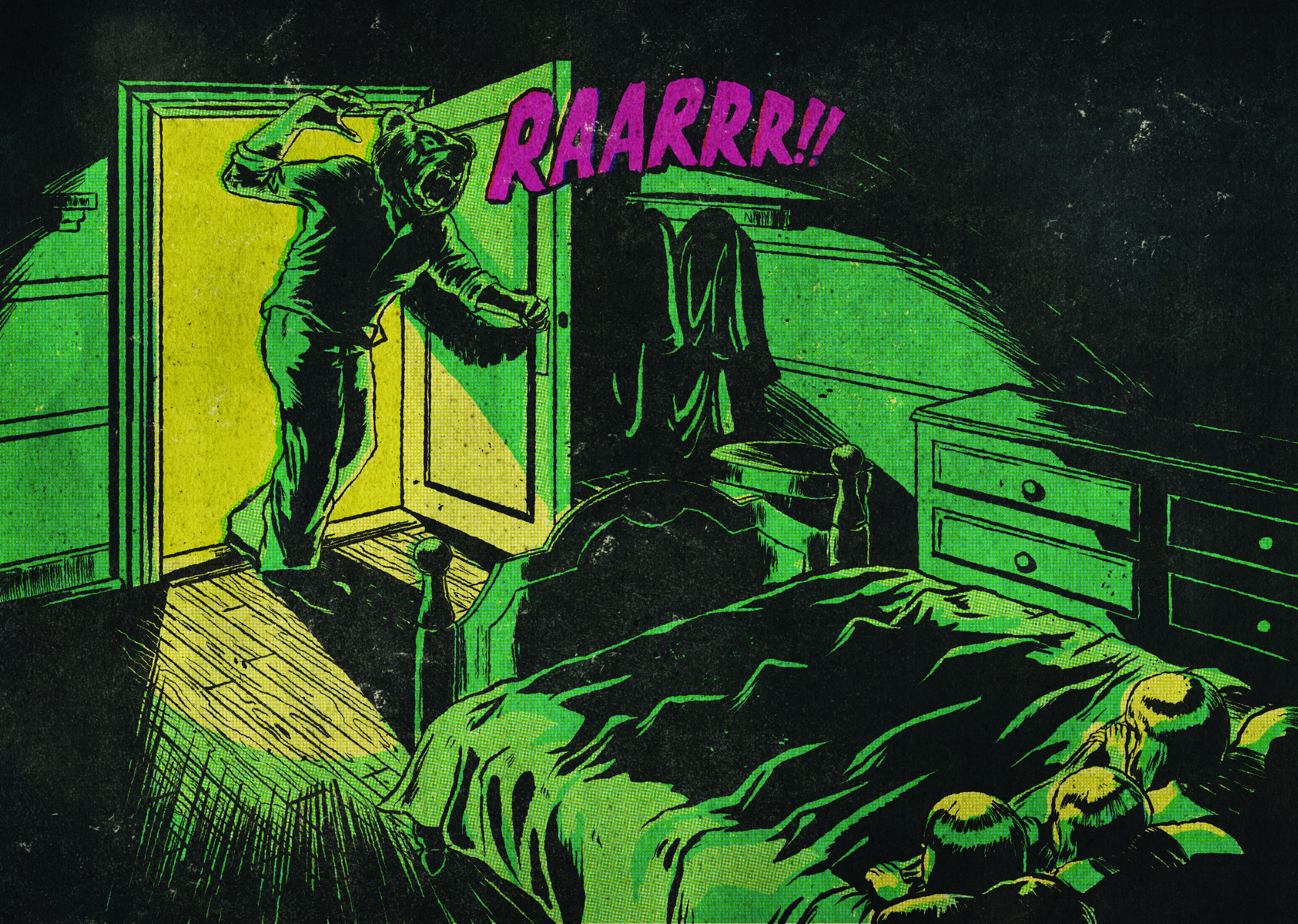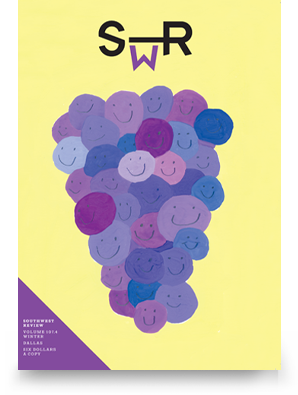
To begin with, the father removes ten years all in one go. He looks phenomenal with no dark circles under his eyes, and in the mornings he goes around yelling yeehaaa with the razor in one hand and a glass of whisky in the other, and by the time he reaches the kitchen his chin has become smooth and clean and his breath is rotten. But that doesn’t bother anyone, because those first days are a celebration. His daughters—there are three of them—adore him. He’s never tired anymore, nor does he yell at them to be quiet or go to bed; now the whisky makes him happy or, as he puts it, gives him a lift. When he gets in from work, the first thing he does is pour himself a glass. Then he goes in search of the girls, making them stretch out their arms so he can grab them by the elbows and lift them up to the ceiling, repeating: How are my little skylarks? How are my swallows? He has even invented a ritual. Once they’re fast asleep, all three of them together in the same bed, he comes in disguised in a bear mask and scares them. The mask allows only his tiny blue eyes to be seen and has a hard, black nose that the girls imagine to be damp, with the scent of the woods. This ritual soon turns into the most eagerly anticipated moment of the night. The three daughters don’t even sleep. They spend all night with their eyes open, huddled under the sheets, whispering to each other: they imagine how he’ll come in through the door, whether he’ll growl, whether he’ll launch a tickle attack, whether he’ll yell yeehaaa once the show is over and then lift them up to the ceiling because they’re his swallows, his skylarks, his little darlings. To begin with, their mother regards this change with suspicion, and in the mornings she’s downcast, her hair unkempt. Perhaps she’s the only one to notice that their father is rejuvenating too quickly. His chest is sprouting fine hairs, and at a certain point she realizes that his smooth chin has become covered in acne—small, greasy pustules that make her recoil when he leans in for a kiss. The girls begin to notice the change when their father starts shutting himself in the bathroom for hours, emerging with his face all red and covered in small cuts that he tries to hide with a white ointment that only makes it look worse. He no longer enjoys his “lift,” everything infuriates him, and he begins to reek of armpits and alcohol from the moment he gets up. Days pass by but resemble years, because the next thing they know, their father is almost a child. To begin with, the daughters play with him, hopping through puddles and catching tadpoles in glass bottles. Afterward, the girls release their tadpoles, but they watch how he takes his and throws them down the toilet. Little by little, they come to realize he’s a dirty, violent child. But their mother protects him. She, too, has changed; it seems she now prefers him this way, as a child, in fact they’re sure she does. Respect your father, she says, when one of them yells at him to let go of her hair or begs him to stop killing animals. At first it was just mice, but now it’s any animal: ducks, foxes, cats. He stalks them, chases them down, and tortures them—pulling out their claws, jumping on top of them—before coming home with his face all covered in muck and eating with his mouth open, demanding seconds and then going around leaving a rancid stench of gases all over the house. And the girls shut themselves away and shed their tears in silence. Since their father became a child, they do everything in silence. Things change. Their father becomes even smaller. He throws tantrums. He breaks things and eats too much, he yells and never switches off the television, leaving it at full volume, with films about aliens and murderers. He’s a horrible child. But their mother prevents them from saying this. She forbids it. He’s not that bad, she says, he’s your father, a father like any other. By now he’s almost unable to speak and has started wearing diapers, but they chafe and nobody is allowed to say anything about the way the child howls like a hyena and throws up all the time. Their mother seems to have become someone else; her hair shines and she puts on lipstick. Now she has to work all day because their father can’t, and it’s the girls who are left to care for him. The three of them take turns changing their father’s diapers and applying cream and talcum powder, they take turns feeding him, rocking him, and putting up with his pinching, his kicking. When their mother arrives home, the first thing she does is check in on him. She’s the only one who can get him to quiet down and go to sleep. She rocks him in her arms and caresses his fat, red face. And when she leaves the room, she asks for silence, complete silence. Then the three girls, their hair dirty and disheveled, move about the house like ghosts so as not to wake their father. They shut themselves in their room and begin covering the walls with drawings of animals they’ve invented: ducks with fox legs, swallows with rabbit faces, curlews with owl wings. They draw these strange creatures and cry. More often than not, they draw the bear mask. In the mornings they have dark circles under their eyes, the house always reeks of piss and shit, and they find their mother cradling their father in her arms, sometimes breastfeeding him while telling him stories, ones they’ve never heard before. They feel nauseous. They no longer go to school, because they can’t leave their father unattended. Sometimes, they take turns going into the woods. Two of them stay with him, while the third just races through the trees, faster and faster, more and more desperate. They run like madwomen, run until they feel an urge to be sick and faint and die, their bodies exhausted. Then they return home and everything starts up again. One day, one of them—the littlest one of all, the quietest—broaches the subject. She suggests they do something. She’s the one who dreams each night of their father and the bear mask, except that at the end, when the moment for their embrace arrives, she removes the mask to find their father’s face deformed and bleeding. Then she wakes up sweating and, because she mustn’t scream, pinches her own hands instead. She’s also the one who fetches the baby carriage their mother has recently purchased and places their father inside it. Let’s take Father into the woods, she says. Her sisters follow, holding hands. The girls walk very close together, as thin as three toothpicks, hunched like old women, with the carriage in front. They take turns rocking their father and telling him not to cry, but he doesn’t listen. When they reach the spot with the eucalyptus trees, the two elder sisters dig a hole, not too deep, scrabbling with their nails until a tiny crib appears in the dirt. The littlest one takes their father and sets him down, gently. Their father kicks, screams, cries. He’s a damn hyena. He’s what remains of their father. The girls start to lob on earth, yelling more and more loudly, flinging handfuls of dirt that begin to cover his face, his tummy, his hands, until they bury him completely, until he is finally quiet. ![]()
Natalia García Freire (Cuenca, Ecuador, 1991) is the acclaimed author of the novels Nuestra piel muerta (2019; translated by Victor Meadowcroft as This World Does Not Belong to Us, 2022), selected by the New York Times as one of the best Spanish-language books of 2019, and Trajiste contigo el viento [You brought the wind with you] (2022). Her journalism, chronicles, and profiles have been featured in BBC Mundo, Univision, Plan V, CityLab Latino, and Letras del Ecuador.
Victor Meadowcroft is a translator from Spanish and Portuguese. His published translations include This World Does Not Belong to Us (Oneworld/World Editions), a debut novel by Natalia García Freire; Stranger to the Moon (co-translated with Anne McLean, New Directions/Mountain Leopard Press) by Evelio Rosero; and five stories by Agustina Bessa-Luís in Take Six: Six Portuguese Women Writers (co-translated with Margaret Jull Costa, Dedalus Books).
Illustration: Casey Booth


